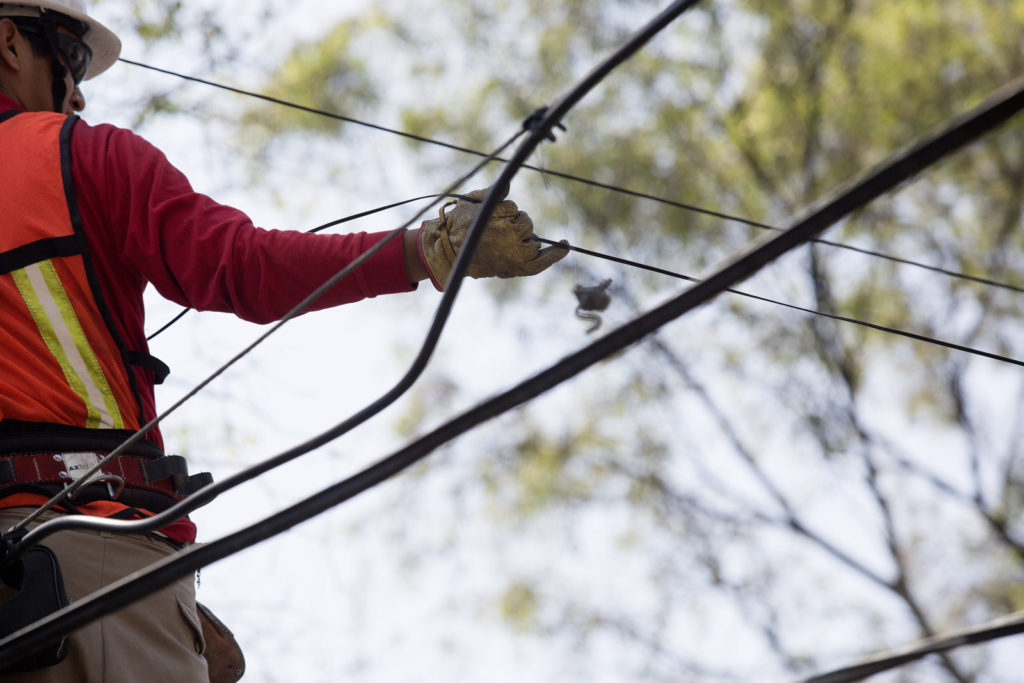
A couple of weeks ago, a group of CEOs from seven small regional ISPs gathered in Washington D.C. to meet with the FCC. In a closed-door conversation with Chairman Ajit Pai and his colleagues, the CEOs made a case against a recent petition filed by USTelecom — a trade association that claims AT&T, Verizon, CenturyLink and Frontier Communications as members. The petition, if granted, would threaten their very existence, and, they argue, the future of competitive high speed internet across the nation.
Filed in May this year, that petition would essentially get rid of a key requirement in the 1996 Telecommunications Act: that incumbent telephone companies are required to sell parts of their copper line infrastructure — called unbundled network elements (UNEs) — to competitors at regulated rates. “The purpose of the 1996 Act was to inject competition to the incumbent markets of companies like AT&T and Verizon,” Ernesto Falcon, a legislative counsel for the Electronic Frontier Foundation, told Engadget.
In the late ’90s, that’s exactly what happened. Small ISPs — called competitive local exchange carriers (CLECs) — cropped up across the country. They used those UNEs to start their own telephone and internet companies. Instead of spending a lot of time and money installing their own infrastructure, they could simply lease out existing copper lines and build out a customer base that way.
USTelecom argues, that it’s not 1996 anymore. It says that there’s already a competitive marketplace and that there’s no longer a need to share its network with anyone. It says that freeing them up from this obligation will allow them to build faster, cheaper networks for consumers.
Except that this is not necessarily the case. Over the years, few CLECs survived. “The dot-com bust was very damaging to a lot of the CLEC industry back in the day,” said Falcon. Most of them went bankrupt or merged with a larger company, like when Qwest was bought up by CenturyLink in 2011. Plus, in many markets across the US, most consumers only have a handful of internet service providers to choose from — it’s either from your cable provider or the telephone company. In fact, CLECs are often the only ISP in rural markets; Socket, for example, has around 20,000 customers spread out across rural Missouri.
Worse than reducing competition, preventing smaller ISPs from gaining access to copper will also hamper the next stage of high-speed internet: Fiber.
There are three ways to get high-speed internet in America these days, said Falcon. The first is through a municipality building its own infrastructure, the second is if a major multi-billion dollar corporation decides to step in (like in the case of Google Fiber) or if it’s through a CLEC.
“We use that copper network to get started,” said Carson Coffman, the CEO of Socket, to Engadget. Socket is a small ISP out of Columbia, Missouri. “We’ll pick out a small town, go in and use that copper to start building customers, building interest and signing up people. Once we get enough revenue, we can go to a bank, and get funding to build our own fiber network.”
That’s the method used by Sonic, another independent ISP based out of Santa Rosa, California. It’s one of the largest CLECs in the country, with over 100,000 customers, but that’s still miniscule compared to the customer base of AT&T and Verizon. It’s currently one of a handful of ISPs delivering fiber to the home in the region. “We’re currently building out Berkeley and Albany, and about a third of the city of San Francisco,” said CEO Dane Jasper.
“If you take them out, then you have almost nothing happening in the high speed market in terms of competition,” said Falcon.
What makes matters more problematic is that the USTelecom petition is utilizing a process called forbearance, which was integrated into the 1996 bill. According to Falcon, the idea behind forbearance is that over time, you can regulate less as competition starts to take root.
“Forbearance is a very powerful tool for petitioners,” said Falcon. “Because the FCC has to vote it down as a majority in order to reject it. If the FCC does not act on it, it will be granted into law by next year. If the FCC has a tie vote, it’s granted into law. The FCC will have to vote it down in order to reject it.”
“By granting this forbearance, a future FCC would have to undo that process first before engaging in the question of open access or shared infrastructure,” Falcon continued. Compounding the issue is that in 2005, when Verizon started to deploy FiOS, the FCC decided to not expand the copper line sharing requirement to fiber in order to spur fiber development. “That hasn’t really happened,” said Falcon. In fact, Verizon stopped deploying fiber years ago, and Google has stopped its build out as well.
There are many ramifications for small ISPs if the petition passes: It could mean no new provisioning (which means no new customers), it could terminate all access, leaving millions of consumers without a new provider, or it would increase prices substantially. In fact, in the initial petition, USTelecom said it wanted to raise prices by 15 percent immediately.
“It isn’t reasonable for USTelecom and its members to say that in a year and a half, competitive carriers no longer have access to copper,” said Jasper. “That creates a real disincentive for them to invest because it eliminates us as a competitive pressure.”
Further, now that the FCC has opted to eliminate net neutrality protections, having alternative ISPs is more important than ever. Some, like Socket and Sonic, have promised to abide by a full neutral web despite the FCC ruling, and offer a meaningful choice to consumers who want that option. If they were to go away, that option would vanish.
“A large billion dollar organization that decides how you’re going to pay for it, will be all that you can choose from,” said Coffman. “You won’t have an option! Your only choice would be to move.”
Right now, the EFF plans to file its own comments to the FCC in August, prior to the vote on August 6th. And, according to Falcon, the FCC has a lot to answer for.
“What they’re arguing is, if we cut people off they [the incumbent] will be forced to deploy more fiber and therefore there’ll be more fiber and more high speed internet and that will mean lower prices and that’s a good thing,” he said. “But what proof is there that the line-sharing agreements have disincentivized the move to fiber?” In fact, he said, the petition if granted would take away their financial means of getting fiber, which would result in quite the opposite to happen.
“The FCC is required by the law to look what the impact to the competition would be if granted forbearance as well as what the impact would be on consumers,” said Falcon. “The FCC has to figure out how many people are affected, look at economic studies, and look at whether that’s true.”
“It will be interesting to see what USTelecom says,” Falcon continued. “They will have to respond to concerns. I just don’t know how will they argue it’s fit for competition. I don’t see how this is in any way good for competition.”
In addition to meeting with commissioners in DC, small ISPs like Sonic and Socket are attempting to get the word out to the public in the hopes that they’ll talk to their senators and local representatives.
“We would like a level playing field,” said Coffman. “Let the consumer pick the product. Let that be the business that wins. Not the government stepping in and saying ‘Oh that’s enough competition because AT&T said there is.'”
























